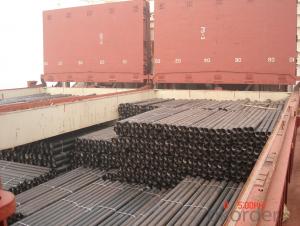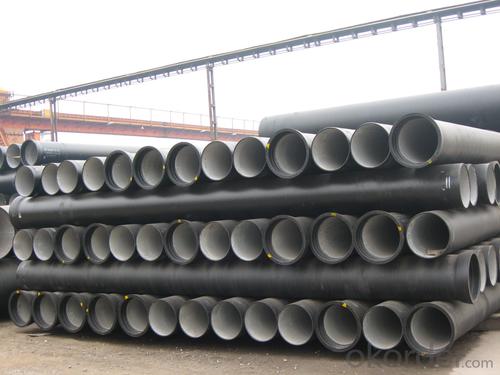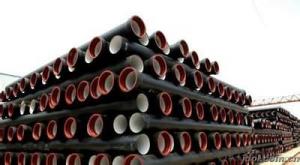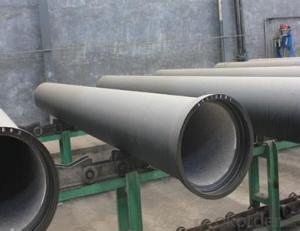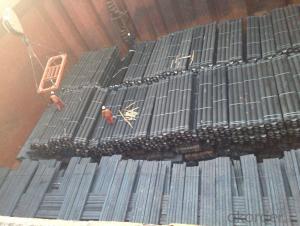DUCTILE IRON PIPE DN1100 K8
- Loading Port:
- China Main Port
- Payment Terms:
- TT OR LC
- Min Order Qty:
- -
- Supply Capability:
- -
OKorder Service Pledge
OKorder Financial Service
You Might Also Like
Specification:
1) The standard of pipe: ISO2531:1998, K9
2) Effective length: 6m
3) Inner cement line: Portland cement line as per ISO4179
4) Zinc coating: at least 130g/m2 as per ISO8179
5) Bitumen painting: at least 70um as per ISO8179
6) With 100% quantity of NBR ring, or SBR ring, or EPDM ring as per ISO4633
7) DN80mm-800mm
8) High strength, lighter than grey iron, good corrosion resistance, no furring, small flow resistance, easy fixing, long life tome about 100 yeas
9) Produced by Hangzhou chunfeng machine
10) Checked by automatic inspection equipment
11) Composition:
Chemical composition | | | | |||
Chemical composition | Ductile Cast Iron Pipe (%) | Grey iron pipe (%) | Steel pipe (%) | | | |
C | 3.5-4.0 | 3.2-3.8 | 0.1-0.2 | | | |
Si | 1.9-2.6 | 1.4-2.2 | 0.15-0.4 | | | |
Mn | 0.15-0.45 | 0.4-0.6 | 0.3-0.6 | | | |
P | ≤0.06 | ≤0.3 | 0.02-0.03 | | | |
S | ≤0.02 | ≤0.1 | 0.02-0.03 | | | |
Mg | 0.03-0.06 |
|
| | | |
12) Feature:
Mechanical properties | | | | |||
| Ductile Cast Iron Pipe | Grey Iron Pipe | Steel Pipe | | | |
Tensile Strength(Mpa) | ≥420 | 150-260 | ≥400 | | | |
Yield Strength(Mpa) | ≥300 | No Confirmation | No Confirmation | | | |
Bending Strength(Mpa) | ≥590 | 200-360 | ≥400 | | | |
Elongation (%) | ≥10 | Neglected | ≥18 | | | |
Brinell Hardness(HBS) | ≤230 | ≤230 | About 140 | | | |
13) T type mechanical joint
14) Packing: in bulk or container
- Q: Can ductile iron pipes be used for underground hydrocarbon pipelines?
- Yes, ductile iron pipes can be used for underground hydrocarbon pipelines. Ductile iron is a strong and durable material that is commonly used in various applications including water and sewage systems, gas pipelines, and even hydrocarbon pipelines. Ductile iron pipes have excellent corrosion resistance properties and can withstand high pressures, making them suitable for transporting hydrocarbons underground. However, it is important to consider factors such as the specific composition of the hydrocarbons being transported and the environmental conditions of the pipeline route to ensure proper material selection and corrosion protection measures are implemented.
- Q: What is the relationship between continuous cast iron pipe and ductile iron pipe?
- Continuous cast iron pipes are usually grey cast iron pipes. Its tensile strength and elongation are much lower than those of nodular cast iron. In chemical composition, grey cast iron has less carbon content than nodular cast iron. According to the organization, the graphite form of gray iron is flaky, and the graphite form in spheroidal graphite cast iron is spherical.
- Q: Are ductile iron pipes suitable for fire protection systems?
- Yes, ductile iron pipes are suitable for fire protection systems. Ductile iron is known for its strength, durability, and ability to withstand high pressure and heat, making it an ideal choice for fire protection systems. Additionally, ductile iron pipes have excellent corrosion resistance, which is crucial for ensuring the longevity and reliability of fire protection systems.
- Q: Ductile iron pipe converter, steel transition DN100 turn 100, what is the specific accessories name? Can you supply photos?
- Strong toughness: the pipe can be stretched to 5 times the original length without fracture, which is suitable for uneven geological conditions without affecting its link performance. In the case of a breach, there is no extension of the mouth due to the breach.
- Q: Can ductile iron pipe be used for water treatment plants?
- Water treatment plants can utilize ductile iron pipe. This material is frequently employed in the water industry because of its robustness, longevity, and ability to resist corrosion. It is suitable for a range of applications, including the transportation of water within water treatment plants. Ductile iron pipe can withstand high pressure and is particularly well-suited for underground installations. Furthermore, it demonstrates exceptional resistance to corrosion from water and the chemicals frequently employed in water treatment processes. Additionally, ductile iron pipe is straightforward to install and maintain, making it the preferred choice for water treatment plants. All in all, ductile iron pipe is a dependable and cost-effective option for the transportation of water within water treatment plants.
- Q: How are ductile iron pipes repaired in case of damage?
- Ductile iron pipes are commonly used in various applications due to their high durability and strength. However, like any other materials, they can experience damage over time due to external factors or internal corrosion. In such cases, there are several methods available for repairing ductile iron pipes. One common method is known as the trenchless repair technique. This method involves repairing the damaged section of the pipe without the need for extensive excavation. It typically includes the use of specialized equipment to access the damaged area and carry out the necessary repairs. This technique is particularly beneficial as it reduces disruption to the surrounding area and minimizes costs associated with excavation. Another method for repairing ductile iron pipes is the use of epoxy lining. This technique involves applying a layer of epoxy resin to the interior surface of the pipe, effectively sealing any cracks or leaks. Epoxy lining is an effective and cost-efficient solution, as it provides a long-lasting repair and improves the overall condition of the pipe. In cases where the damage is severe or extensive, the damaged section of the ductile iron pipe may need to be replaced. This typically involves cutting out the damaged portion and installing a new section of pipe. The replacement process may require excavation and can be more time-consuming and costly compared to other repair methods. However, it ensures a complete and permanent solution for the damaged pipe. It is worth noting that the specific repair method chosen for ductile iron pipes depends on the extent of the damage, accessibility, and other factors. Professional assessment and inspection are crucial to determine the most suitable repair technique. Consulting with experienced pipeline repair specialists or civil engineers is highly recommended to ensure the most effective and durable repair solution for ductile iron pipes.
- Q: What is the expected fatigue life of ductile iron pipes under cyclic loading?
- The expected fatigue life of ductile iron pipes under cyclic loading can vary depending on various factors such as the material properties, design considerations, loading conditions, and maintenance practices. However, ductile iron pipes are generally known for their excellent fatigue resistance, and when properly designed and installed, they can have a long fatigue life of several decades or more.
- Q: Can ductile iron pipes be used for stormwater drainage?
- Yes, ductile iron pipes can be used for stormwater drainage. Ductile iron pipes are known for their strength, durability, and ability to withstand heavy loads, making them a suitable choice for various applications, including stormwater drainage systems.
- Q: How can stainless steel pipes and ductile iron pipes be joined?
- The stainless steel pipe can be used as a socket or socket, so as to be directly connected with the connection mode of the ductile iron pipe
- Q: How are ductile iron pipes connected together?
- Ductile iron pipes are typically connected together using a jointing method called push-on joint. This involves lubricating the spigot end of one pipe and inserting it into the bell end of another pipe. The two pipes are then pushed together until the spigot end reaches the center of the bell end, creating a tight and secure connection.
Send your message to us
DUCTILE IRON PIPE DN1100 K8
- Loading Port:
- China Main Port
- Payment Terms:
- TT OR LC
- Min Order Qty:
- -
- Supply Capability:
- -
OKorder Service Pledge
OKorder Financial Service
Similar products
Hot products
Hot Searches
Related keywords

